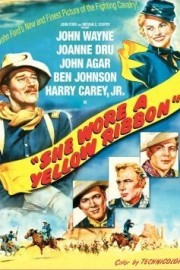She Wore a Yellow Ribbon
John Ford understood how to tell a great story in an economical way. Nowadays, genre films tend to tip the scales to about 2 1/2 hours or more, even when you’re discussing something like a mindless exercise in confusing action like Michael Bay’s “Transformers” films. With some films, you feel like the time was well worth spent, but others, it’s a slog just to get up to the halfway point. One look at the running time of one of Ford’s greatest films, “The Searchers” (which is just around two hours), and you wonder, “Why the Hell can’t filmmakers nowadays do that?”
In his 1949 film, “She Wore a Yellow Ribbon,” Ford and his screenwriters (Frank Nugent and Laurence Stallings) tells a story even more sprawling than he did in “The Searchers” and “The Grapes of Wrath” in considerably less time (a brisk 1 hour 43 minutes). I’m focusing on running time not just to illustrate how far astray filmmakers today seem to move in telling simple stories, but also to set up how great a storyteller Ford is. Sure, he could go on a bit long at times, but he wasn’t interested in complicating the plot more than he had to. He was very much an audience-savvy director, understanding what the viewer wanted to see when they went to see one of his films, and showing it to them. There is a very clear three-act structure to his films that has been forgotten by a lot of genre filmmakers (or abused for the sake of “tension”), and it would be gratifying to see that simplicity of storytelling to come back to genre efforts.
“She Wore a Yellow Ribbon” tells the story of westward expansion in the 1800s, which was a popular tale of Ford’s to tell. Taking place after Custer’s Last Stand, cavalry officer Captain Nathan Brittles (John Wayne) is a week from retirement, and looking forward to it, although he wishes he could be spending it with his late wife. Unfortunately, the loss Custer and his men took seems like a step back for the movement west, with the army worried it will take years to get another wagon train west if they don’t take action now. They decide they need Capt. Brittles’s expertise to help clear the way, although he has to make sure he can keep his troops in order in case they need to fight against Indian tribes while aiding a wagon’s journey. Meanwhile, one of the female visitors the cavalry is helping across the plains causes unrest within his troops, including the man Brittles is supposed to be leaving his troops to when he retires. Even when he does retire, though, he finds the call of his responsibilities strong, and hopefully, being able to bring diplomacy to his mission rather than bloodshed.
The exciting thing about Ford’s films are how they bring humor and heart to big stories filled with energetic set pieces and intelligent characters, and remain believable representations of time and place, even if things seem to go into Hollywood fantasy. In his westerns that I’ve seen, I think that’s due to having John Wayne at the center of his movies, and surrounding him with strong casts (in the case of “She Wore a Yellow Ribbon,” that includes Joanne Dru, John Agar, Ben Johnson and Harry Carey Jr.). While Ford famously quipped that he didn’t know Wayne could act when the actor finally won an Oscar for “True Grit,” that quote feels more like a gentle ribbing between friends than a surprising revelation, especially since Wayne and Ford collaborated many times over their careers, spanning decades, and on many classic films. As Brittles, Wayne shows some real weight as an actor in playing a military officer who is at the end of his career, and isn’t prone to sentiment, but shows at times how profoundly he feels that his time is coming to an end. This is never more true than in the last 30 minutes of this film, starting when he has to break up a petty fight between his two leading officers in his regiment. This is some great work by the actor, and brilliantly put on screen by Ford, who may have joked about how talented his leading man was, but knew exactly how good he was, and put it on display many times.










